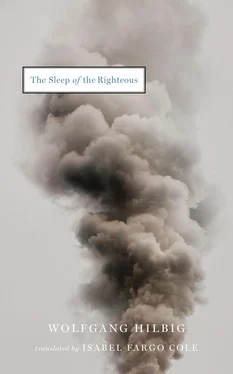It sounded like an attempt to justify his frequent visits to the small town where his mother still lived. No one whosoever had asked. And yet he volunteered replies; his letters and postcards were composed of evasive, overcautious replies to questions no one had asked, making the whole thing even more mysterious: it seemed he was merely answering his own questions. It astonished him that he couldn’t find a self-evident reason to visit the house where he was born, that coming to town to see his mother wasn’t reason enough.
What am I actually trying to remember? he’d ask himself, back from the mailbox. — In the old days I’d have had to get up an hour ago to report punctually for the life I barely recall now. — His mother had had to wake him each morning, and by the time he appeared in the as-yet unheated kitchen, which still smelled of his cigarettes from the night before, she would have the coffee ready. — Then we sat facing each other in silence; I drank my two cups of coffee while she waited for me to make it out the door. For years, at that ungodly hour, we were this taciturn, tight-lipped couple, sunk in our separate worlds. And shut away within, we probably held the knowledge of all the nameless generations before us that had sat just like this in the dark winter mornings, man and woman, waiting mute and servile for the urgent start of the workday to part them: my grandfather had occupied this place, and then she’d sat this way with her husband, my father, and after that it was the same thing with me; it seemed an inescapable fate. — C. asked himself at times how many memories were sealed within her, in the withered, forbidding old woman’s body from which nothing emerged to the outside.
He’d feel warmth again only once he passed the watchman, when he’d crossed the dark yard of frozen grass behind the administrative building and reported to the boiler room, which was located beneath the showers and changing rooms. Only after taking over from the night shift would the frost leave his limbs and warmth return to his unfeeling face. — The night shift was a scrawny, somber individual who answered to the name of Gunsch; his first name was unknown, forgotten because it couldn’t be pronounced, and as no one called him by it, perhaps he himself had long since forgotten it. Even his time card bore only the handwritten name Gunsch . He came from a town the other way down the railroad tracks, an old Pole who, it was claimed, had been pensioned off some unknown number of years ago and pursued his job in the boiler room for no reason but avarice. But these claims ignored the fact that at the start of each winter the factory had to talk him into postponing his retirement for one more heating period. It was nearly impossible to find workers to man this old, outlying factory wing; most of the people working here were indisputably in banishment. Production Area 6 was the official name of the steep bluff that jutted, a spit of earth seemingly spared by chance, into the foggy void of the mine pits. . on whose tip, next to a disused, derelict, red-brick briquette plant, a new production hall had been constructed, painted green, with glass walls that made it nearly impossible to heat. . This factory wing, this last loose fang in the lost dentures of the workers’ and peasants’ state, was the workplace of the delinquents, the alcoholics, and those who had rebelled against the factory hierarchy, people, in other words, who had to be sent out of sight.
When C. came to relieve him, Gunsch was ready and waiting in his street clothes; their color and cut differed little from his work clothes, but now his neck and head were muffled with scarves and a military-looking leather cap with earflaps. His little face showed shadows of coal dust and ash that the water of the shower could not dispel, and the color of the coal had eaten its way into his chapped hands. He pointed his stubby black finger around the boiler room, mumbling incomprehensible explanations; C. nodded pro forma agreement to everything, and at last the old man vanished. C. climbed back up the stairs from the boiler room to stamp his colleague’s time card in the factory hall; his card had been marked by Gunsch half an hour ago with the wrong arrival time. As day broke, one saw the old man riding his ramshackle bicycle into the fog and the ice. On barely detectable paths along the railroad tracks, he pedaled away between the chasms of the mine pits; each time one wondered when the ground in front of him would peter out into nothingness and this strange black bird, forced to flap up from the treacherous terrain, would rise into the air.
When Gunsch spoke, no one could understand a word, but that was all right, for he rarely said anything of a communicative nature. No one knew exactly how and where he lived, what he did with his money, whether he even kept human company outside working hours. There was a persistent legend that he dwelled in the midst of the mine pits, in a house without electricity, cut off from the outside world, his farmstead all that remained of a tiny village that had been bulldozed because it stood atop the coal. In the middle of his garden the ground broke off into the depths, said those who claimed to have seen it; of course most of the stories told in Factory Wing 6, the raving drunkards’ wing, were wildly exaggerated. He bought his necessities at the factory’s little store, wrapped them up in burlap and transported them on his bicycle rack out into the no man’s land from which he hadn’t set foot since the end of the war. At some point in the unfathomable years of his life he had come here from the East —the direction alone seemed to convey enough about that blurrily bounded region from which C.’s grandfather had also immigrated at the turn of the century. At any rate, the German Gunsch spoke was laid waste in a way C. knew from his grandfather. Due to these putatively shared origins, he had begun to take an interest in the old Pole. Gunsch regarded all attempts at understanding as pointless from the outset. When he opened his mouth, he seemed to spout only curses, and no one in the boiler room knew the exact object of this abuse.
Of course, proper German was no requirement for the backbreaking work of the boiler room. It sufficed that he could fill the iron coal wagon, which loomed taller than his alarmingly narrow shoulders, about eight or nine times every four hours, quickly enough that pressure would build up in all four boilers at once, sending the steam all the way back into the new factory hall. A bag of bones like Gunsch, the stokers claimed, actually had an easier time of it in the cramped coal bunker than a person of normal — that is, halfway brawny — stature, who’d tear his clothes and scrape his skin on the roughly plastered bunker walls.
And he leaped much more nimbly out of the cloud when the tippers full of ash were emptied outside on the dump. He’d stand off to the side with a pitying look, or rather a pitiless grin, while we sought cover under the tipper or waited with turned-up collars, bent backs braced against the exploding cloud, breathless, eyes closed, until the onslaught had passed. It was always blustery in the mine pits, and just as quickly as the ash flowed from the overturned tipper, it was beaten back as a scorching hot wave. Practice was required, and if you failed to anticipate the direction of the wind, you’d leap straight into an inferno meters high.
And finally, twice a month, Gunsch had to scribble something resembling his name in the proper column of the payroll when the secretary showed up in the boiler room with a little steel box full of money. — This, too, was one of the things that could just as well have been done by a deaf-mute.
I recalled a time I’d been able to observe the old man over the space of several days. It was a Christmas weekend, and then on past the New Year, when the holidays were canceled for Production Area 6 because of a special order. That of all times was when the temperature sank to minus ten Celsius; it was decided that a cold snap like that called for staffing the boiler room with two people, as the fifth boiler, regarded as the final reserve, had to be heated as well. No one wanted to work with Gunsch, and so I agreed to play the second man on his shift. — He doesn’t talk much anyway, I thought, and besides, I probably have the fewest problems with his German.
Читать дальше












